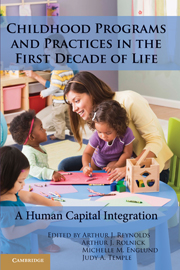Book contents
- Frontmatter
- Contents
- Contributors
- Foreword: The Essential Role of Youth Development by Robert H. Bruininks
- Acknowledgments
- 1 Early Childhood Development and Human Capital
- PART I PRENATAL AND INFANT PROGRAMS
- PART II PRESCHOOL EDUCATION
- 6 Project Head Start: Quality and Links to Child Outcomes
- 7 The Challenge of the HighScope Perry Preschool Study
- 8 Impacts and Implications of the Child-Parent Center Preschool Program
- 9 Small Miracles in Tulsa: The Effects of Universal Pre-K on Cognitive Development
- 10 Lessons From the Evaluation of the Great Start Readiness Program (GSRP): A Longitudinal Evaluation
- 11 Abbott Preschool Program Longitudinal Effects Study Year One Findings
- Commentary: Are We Promising Too Much for Preschool Education Programs?
- PART III KINDERGARTEN AND EARLY SCHOOL-AGE SERVICES AND PRACTICES
- PART IV ECONOMIC SYNTHESES OF EARLY CHILDHOOD INVESTMENTS
- Appendix Question-and-Answer Sessions
- Name Index
- Subject Index
- References
9 - Small Miracles in Tulsa: The Effects of Universal Pre-K on Cognitive Development
Published online by Cambridge University Press: 05 June 2012
- Frontmatter
- Contents
- Contributors
- Foreword: The Essential Role of Youth Development by Robert H. Bruininks
- Acknowledgments
- 1 Early Childhood Development and Human Capital
- PART I PRENATAL AND INFANT PROGRAMS
- PART II PRESCHOOL EDUCATION
- 6 Project Head Start: Quality and Links to Child Outcomes
- 7 The Challenge of the HighScope Perry Preschool Study
- 8 Impacts and Implications of the Child-Parent Center Preschool Program
- 9 Small Miracles in Tulsa: The Effects of Universal Pre-K on Cognitive Development
- 10 Lessons From the Evaluation of the Great Start Readiness Program (GSRP): A Longitudinal Evaluation
- 11 Abbott Preschool Program Longitudinal Effects Study Year One Findings
- Commentary: Are We Promising Too Much for Preschool Education Programs?
- PART III KINDERGARTEN AND EARLY SCHOOL-AGE SERVICES AND PRACTICES
- PART IV ECONOMIC SYNTHESES OF EARLY CHILDHOOD INVESTMENTS
- Appendix Question-and-Answer Sessions
- Name Index
- Subject Index
- References
Summary
Parents and public officials are increasingly concerned about the school readiness of young children. In response, in recent years, state governments have boosted their support for pre-K programs. Several states, including Oklahoma, have opted for universal pre-K, making it available, on a voluntary basis, to all 4-year-olds. At the same time, the federal government, through the No Child Left Behind Act, has imposed new testing requirements on public schools to determine whether students as a whole and particular subgroups of students are making good academic progress. These trends have heightened interest in the effectiveness of pre-K programs.
The Oklahoma pre-K program is of special interest because it enrolls a higher percentage of 4-year-olds than any pre-K program in the United States (Barnett, Epstein, Friedman, Sansanelli, & Hustedt, 2009). It is also of particular interest because it is based in the public schools and because it places strong emphasis on high quality: All lead teachers must have a college degree and be early-childhood certified; to facilitate the recruitment and retention of outstanding individuals, lead teachers are paid at the same rate as other public school teachers.
Many studies have demonstrated that considerable benefits flow from a high-quality targeted pre-K program. But can a large-scale universal pre-K program also produce substantial benefits by enhancing the school readiness of young children? Do all children benefit from such a program? Do some children benefit more? And how large are the impacts of such a program, in absolute or relative terms?
Information
- Type
- Chapter
- Information
- Childhood Programs and Practices in the First Decade of LifeA Human Capital Integration, pp. 188 - 198Publisher: Cambridge University PressPrint publication year: 2010
References
Accessibility standard: Unknown
Why this information is here
This section outlines the accessibility features of this content - including support for screen readers, full keyboard navigation and high-contrast display options. This may not be relevant for you.Accessibility Information
- 2
- Cited by
